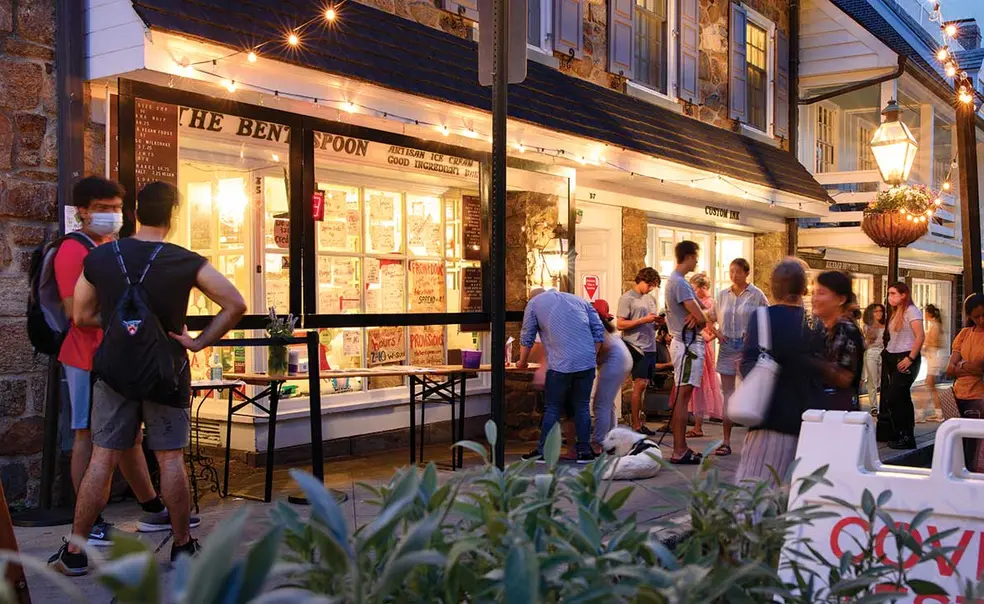With Helping Hands, Most Princeton Businesses Weathered COVID
Changes, grants, and more have kept small businesses afloat during the pandemic
Business looked healthy, but signs of the pandemic remained. Wood-framed sheets of plexiglass separated the masked staff from patrons, and a parking space bordered by concrete barriers and raised garden beds provided extra outdoor gathering space. Bent Spoon co-owner Gabrielle Carbone said COVID has presented plenty of challenges, and she’s been encouraged by “how people just all tried to rally around each other.”
The absence of students for more than a semester, combined with the loss of Princeton events like Reunions, contributed to the pandemic’s toll on local retailers. The Princeton University Store, which operates as a co-op, was particularly hard hit, experiencing an 80-percent drop in sales during the first three months of the pandemic. Recent receipts are still lagging about 20 percent behind pre-COVID levels, according to U-Store president Jim Sykes. “At this point, things are definitely improving,” Sykes said. “We’re fairly optimistic that we’ll get much closer” to normal.
Local businesses and restaurants received critical assistance from the federal Paycheck Protection Program (PPP) and the Restaurant Revitalization Fund for large expenses such as payroll, rent, and construction of outdoor seating. The University also played a role in aiding the business community, contributing $350,000 to the Princeton Small Business Resiliency Fund, a partnership with local officials and the Princeton Mercer Chamber of Commerce Foundation. As of May, the fund had given $5,000 grants to more than 90 local businesses.
In March, the Office of the Dean of Undergraduate Students launched “Tigers in Town,” a program in which campus groups purchased credits for snacks that students could redeem at a local restaurant or shop. “I think the pandemic highlighted for the campus community how having a vibrant downtown near campus is a resource to us all,” said Kristin Appelget, the University’s director of community and regional affairs.
Some familiar storefronts emptied during the pandemic. Landau, which had sold woolen goods in Princeton for 65 years, closed last fall, partly in response to the pandemic but also because its owners were retiring. Nearby locations of the Panera Bread and Qdoba chains also closed, along with Princeton Pi, which has been replaced by another pizzeria called Proof.
But with the help of changes such as curbside pickup and greatly expanded outdoor seating for restaurants, most local businesses have remained up and running. This year, a new crop of local spots emerged, including Planted Plate, a vegan restaurant on Spring Street; and two new bakeries on Witherspoon Street, Bread Boutique and Delizioso. Palmer Square has announced three new arrivals: Warby Parker (which opened in July), Arhaus, and Lala Lobster.
“While we have seen an increase in activity in recent months, we are hopeful we will not revert in the fall and will continue building momentum, culminating with a much needed strong and prosperous holiday season,” said Lori Rabon, vice president of Palmer Square and the Nassau Inn, in an email to PAW.
Some windows of spaces that are still waiting for new tenants have received a fresh look in the form of large reproductions of artwork from the Princeton University Art Museum’s collections. The project, “Art for the Streets,” was spearheaded by museum director James Steward, a member of the Princeton Merchants Association board. Steward said in a news release that the project aims to “enliven our town’s streetscapes and do our part to support local businesses, residents, and visitors at such a difficult time.”










No responses yet